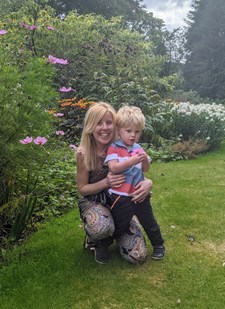The powers and practicalities of genetic testing
Published Date: 26 Nov 2020
Our son Joshua was diagnosed with a hearing loss just a couple of weeks after he was born. You can read more about his diagnosis and our early struggles with hearing aids in our previous blogs.
Not long after his deafness was diagnosed, our audiologist asked us if we would like him to be referred for genetic testing to see if we could find an underlying reason for the hearing loss. She warned us there was a long waiting list. By the time we reached the top of the list we had adjusted to life so comfortably with the hearing aids that we were unsure if further information would end up making our lives easier or harder. However, we have always thought ‘knowledge is power’ so we prayed about it, said ‘yes’ and continued our journey.
The first stage of the assessment involved a series of phone calls where a geneticist took a comprehensive medical history and discussed the results of numerous tests Joshua had already endured – vision tests, blood tests, audiological evaluations, a kidney scan and an MRI scan to name just a few! This was followed by a physical examination, where I was surprised at the amount of detailed photographs the geneticist needed to take of all parts of his body – I hadn’t before appreciated how much information you can gain from the exact shape of marks on hands, feet and faces!
Things went very quiet after this; so much so that we had almost erased the memory of these tests and discussions from our minds! We were also well aware that tests only identify a cause of deafness in 40–50% of children and so felt quite comfortable with ‘never knowing’.
However, a surprise phone call came from the geneticist around a year later, in the middle of one of my working from home days just at the start of the Covid-19 pandemic. This would have been a face-to-face appointment under normal circumstances. The geneticist explained that a mutation had been found in one of Joshua’s genes called CHD7, leading to an underlying diagnosis of a condition called CHARGE syndrome. This was a great shock at the time.
As soon as I put the phone down, I did what was probably the last thing I should do – use Google to find out more! What I saw confused me even more since my search revealed that babies born with CHARGE syndrome are often born with life-threatening birth defects and tend to have extensive medical and physical difficulties. I didn’t feel that Joshua matched the description. It was difficult to find out more as CHARGE syndrome is a very rare condition which only occurs in one in every 8,000-10,000 births. After we’d had a couple of days to get our head around it, the geneticist phoned again to answer more specific questions. Between these phone calls, I’d also had the opportunity to speak to a number of professionals involved in Joshua’s care. I also joined a number of support groups and spoke to a very helpful local parent who helped me to recognise that Joshua did in fact have more characteristics of CHARGE syndrome than I’d considered before but fortunately only suffered very mildly.
The diagnosis alerted us to another couple of issues it was important to get checked out so we’ve had a number of additional tests since but can fortunately say that the only significant signs and symptoms that he currently exhibits are hearing loss and a developmental delay. While we feel so grateful that Joshua’s experience of CHARGE syndrome is so mild, we take our hats off to so many new ‘CHARGERS’ we have come to know and admire. One of the hidden features of CHARGE syndrome is said to be the determination and strong character these children display, and we couldn’t agree more!!
Although nearly all children with CHARGE will take longer to achieve things, children who appear far behind their typical peers can eventually catch up. The knowledge of the diagnosis has helped us to ensure that we and his medical team put all of the right support in place to help him to thrive. It’s also given us a precise indication of recurrence in our future children (less than 1%) and Joshua’s future children (50%), so this is obviously extremely valuable information in helping both us and him to make future decisions!
